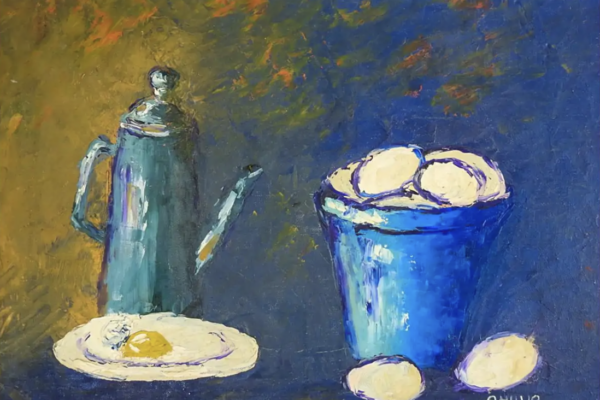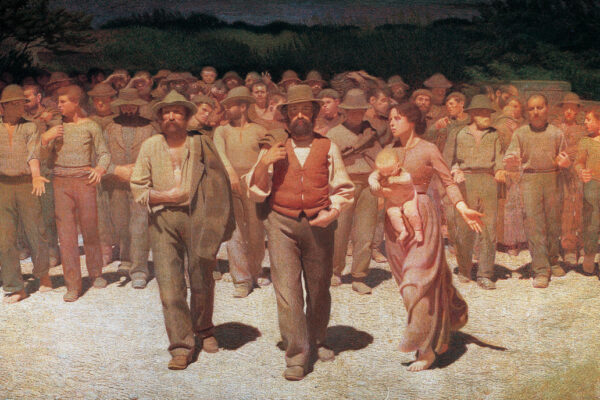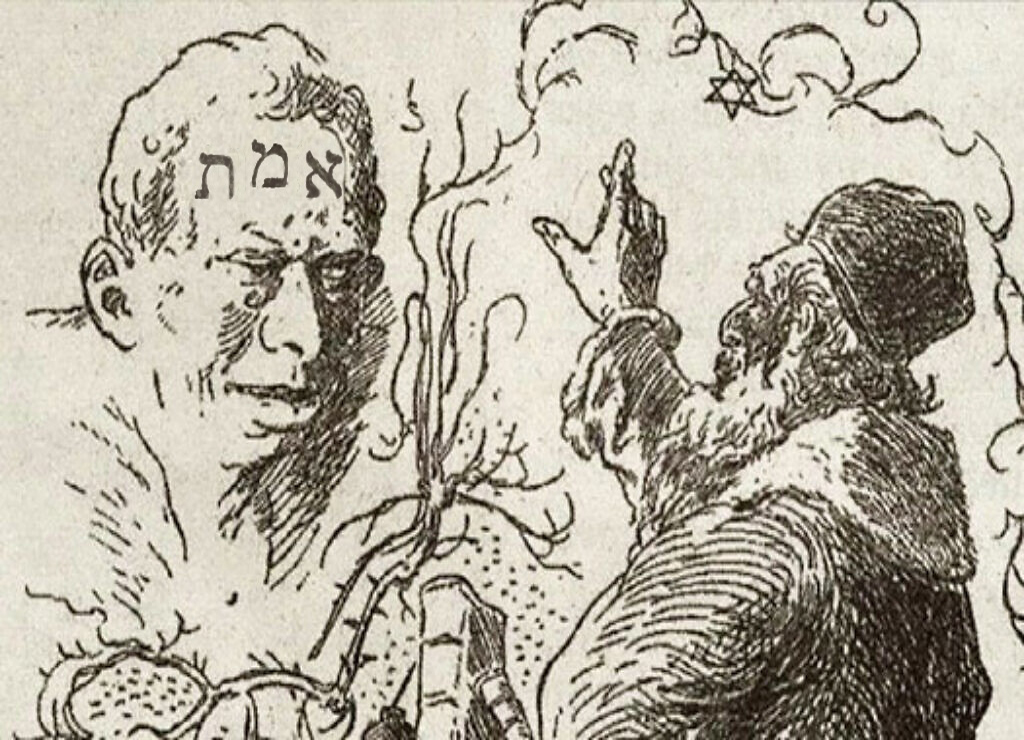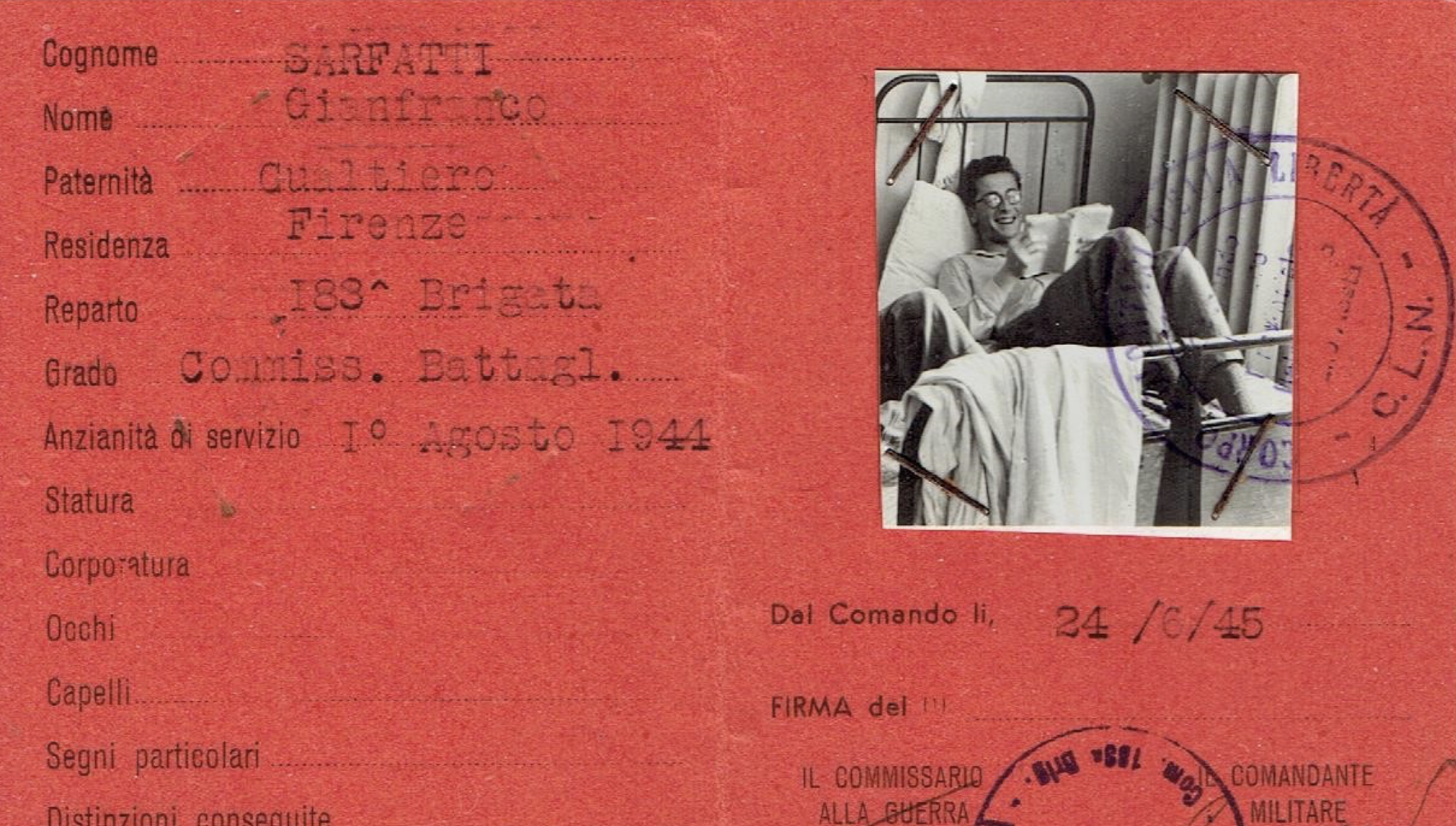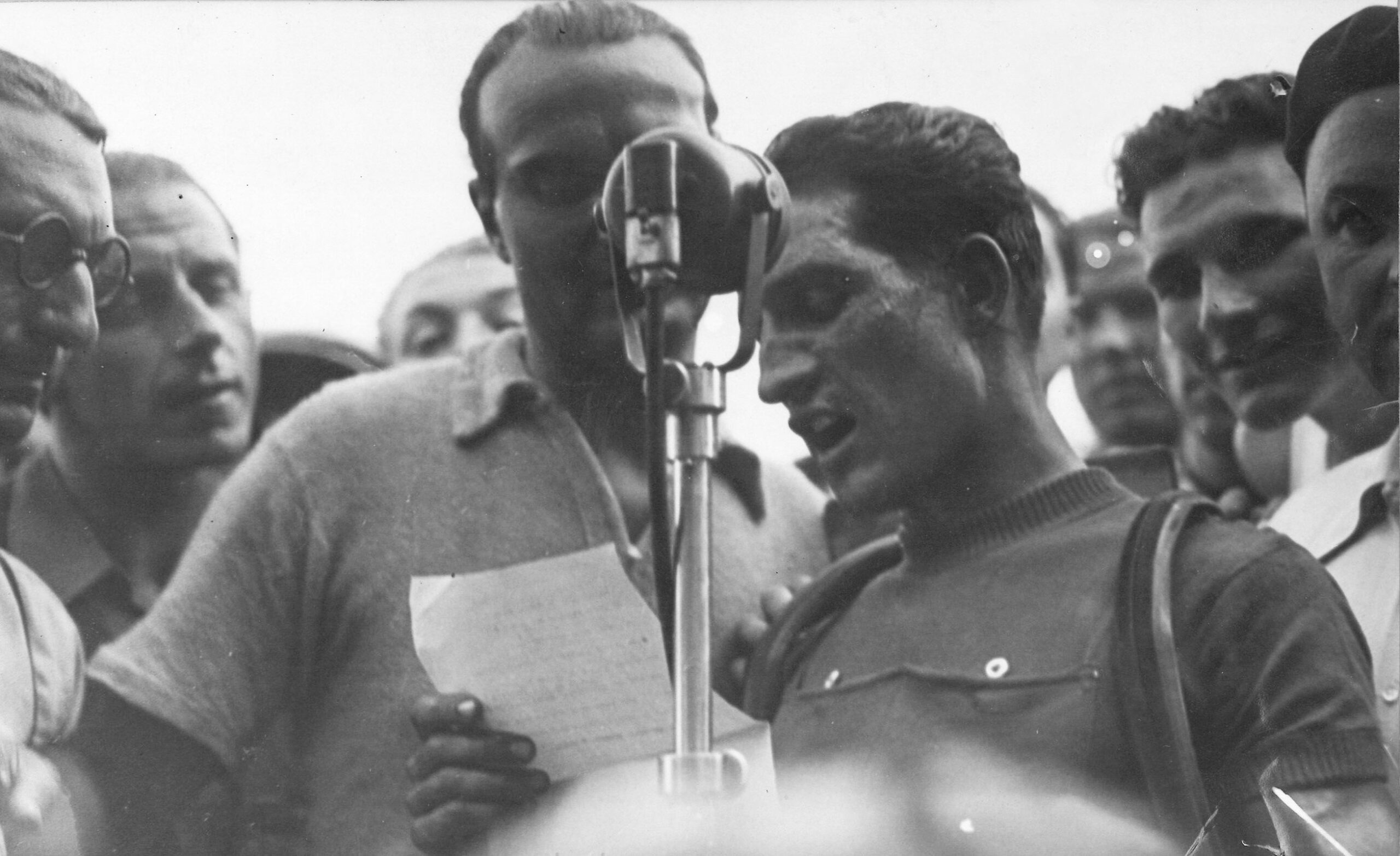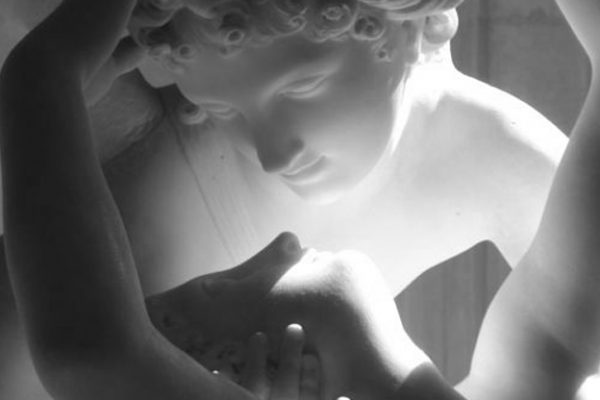The complex and often elusive workings of memory (including the memory and memorialization of the Shoah) have been often explored also by literature, from the immediate post-war period to the present. On the occasion of the the 2021 Giornata della Memoria ( Holocaust Remembrance Day) , Printed Matter would like to offer to its readers a contemporary shorts story which explores, in fiction, the relationship between the living memory of the Shoah, and its memorialization.
The cloister of the old cemetery of San Pietro in Vincoli is bathed in sunlight. The grass is high. It’s probably May or June. I remember it because I was working on my thesis about Anton Walbrook and came every day to do research at the History of Cinema library.
I had come here so many times that I no longer noticed that the university library was located in a cloister within the grounds of a disused cemetery. In fact none of us students paid the slightest bit of attention. It’s only thinking about it years later – this period of university studies in the history of cinema now long since over – that I realize how little connection I perceived between these apparently distinct realities: a library and an abandoned cemetery.
We managed to see old films – we’re talking here about the years when there was just one VCR at the Institute of Film History – only on movie club nights in the basement of the Science Academy and whenever they projected a film during the occasional seminar. We often studied directors whose films we had never seen or, if we had seen them, were exhibited on the most rough-and-ready prints imaginable.
The library had a rich and exhaustive archive, however, that made up for many of our institute’s shortcomings. It was also through these explorations in print that there awoke in me a desire filled with nostalgia for those films that I had not yet seen but had merely read about.
The only thing that bothered me about the library was that to reach it I had to cross a field of wild grasses that made my eyes burn and fill up with tears. I don’t believe it ever occurred to me that this soft field had once been studded with headstones nor did I ever ask myself where all the dead bodies had gone, whether they had been returned to their descendants or relocated to an ossuary or even if they might still be there below me, sealed within their tombs.
I avoided crossing it, not for what it had been but for what it had become: a field of weeds. I quickly skirted around the three sides of the portico until I was able to slip through the glass door of the library and out of reach of the long grasses and the invisible flight path of their seeds.
I went back for a visit with my friend June, an attractive volunteer who works for the Touring Club of Italy. She acts as a custodian, rotating with other volunteers between several historic sites around Turin. It was she who told me, in her soft American accent, that the library where I studied had only been temporary. Today San Pietro in Vincoli hosts cultural events, art exhibits and conventions. The cloister is just as I remember it: small in scale with perfect proportions. “It always brings to mind Mrs. Astor’s ballroom and the legendary Four Hundred,” says June. “The ballroom was built to entertain just four hundred guests, not one more or one less, such being the number of people in New York’s high society. They say the same principle was applied here when the cemetery was first erected for the local nobility at the end of the eighteenth century.”
Unlike Mrs. Astor, however, who would never have allowed socially undesirable guests at her ball, here they ended up accepting everyone: unbaptized babies, the mortal remains of suicides and finally even those who had been condemned to death by hanging – all destined for the charnel house of course. I remark to Jane that belonging to a restricted circle, like that of Mrs. Astor’s Four Hundred and even in this case, demands some form of compromise. “In any event,” she chuckles, “it was over-crowded. Try to imagine it. The cemetery is overflowing. Hygiene is terrible. Awful smell everywhere. They close it – for good.”
She turns around and points at the cloister walls. “Everything that could be stolen was stolen.” Those headstones removed with a chisel have left traces on the surface like missing paintings in a gallery. But two headstones remain side by side. You cannot help but notice them. They stand out as the only survivors after so many years of assault and vandalism.
“An Italian officer and an English lady were married and presumably living together in Turin…like me, “ says June. “I met my husband when I was on vacation in Italy and ended up staying. I’m going back to New York for Christmas, but by now I feel at home here.”
“How did these two end up in Turin in the mid-nineteenth century only to be buried in a cemetery reserved for nobility and hanged men?” I ask her.
“Who knows? Travellers. Merchants. Officials. People travelled the same as they do today. We tend to judge people of other times by our own standards. Today coming from London in a horse and carriage seems like a rare and difficult thing to do, but they did it much more often than we think, believe me.”
There are no other headstones in this devastated cemetery, only empty places. Left alone, the dead seem somehow even deader. I mark down these two names and hastily copy their epitaphs on a little piece of paper. I don’t want to be seen. I feel a bit ashamed as if there were something morbid about what I’m doing. At home I have three shoeboxes full of similar bits of paper: each time I find a memorial stone
I transcribe the information on it. I gather names and dates and places and try to piece together stories about people who no longer have them.
Over time I have learned to spot them – those headstones and markers that are everywhere in our cities – from the most recent ones to those of the last World War. A cluster of names might be found in a chance place of death. Victims executed in the street will have their names embedded next to a newspaper stand or a bar or a pizzeria. There are names of men and women, and many children too. They will include a date, or at times the age of the person or a photograph. They constitute a map, showing us where a story ended in that intersection between the personal and the collective. I am no longer embarrassed about transcribing their names or reading them carefully. I feel they’re alive – memory’s curbstones – and the silence and distraction of the passers-by protect them, their gaze touching them without seeing them. I want to think of these headstones, all memorial stones, as engraved words that enclose entire worlds that happened – events concluded, reconstructed, conceivable, avoidable – like signposts to memories that won’t fade but project themselves into the future to compensate for the limitations of our imagination.
Distance, as travellers know, narrows one’s focus; and distance is memory, the very essence of memory which either trashes or conserves; which stores, accumulates, consolidates and projects every instant somewhere else. The future will also become a memory, one that will use words so as not to be lost.
Two sisters, Rome 2011
Rome is bathed in a warm, invigorating light. It’s the first light of spring. It has rained over the last few days so the air is very clear. The limpid light makes the entire city appear to be under glass. I recall the closed door and Laura searching her purse for the keys as I glance down at the pavement in front of the entrance.
There are five of them. Five shiny brass cobblestones embedded in the pavement in place of the usual ones made of basalt rock. Each one is inscribed with a name and two dates, a birth date and the 16th of October 1943. Guido and Laura. Then Carlo, Arrigo and Anita, ages seven, five and three. The last line is the same for all of them: deported to Auschwitz. Place of death unknown. Date of death unknown.
My sister and I are standing one in front of the other. The area surrounding the door of Via Anicia is unusually silent and deserted. A whirlpool of dry leaves swirls about and a rectangular piece of tin foil, perhaps from a packet of cigarettes, somersaults a couple of times before making a delicate landing. Another gust of wind from the opposite direction disperses them all. The leaves scatter but the tin foil is caught in a crack between two cobblestones.
I take out my notebook and write down the names and the date. Laura gives me a curious look.
“Why are you doing that?”
“I don’t know. Because I want to know, I suppose.”
She shakes her head and points at one of the brass blocks.
“Did you see that? She was called Laura.”
“Yes I saw.”
“You’re not being morbid?”
The tone of her voice makes it sound more like a statement than a question, but I know she meant it as a question.
We were both born many years after the searches, the deportations, the executions, and the reprisals. We read about them in our history books; we saw them at the movies, in documentaries; we read about them in the newspapers on Memorial Day holidays, wincing at the clarity of the survivors’ memories. As children we lived in a large city in northern Italy on a long tree-lined street, the same one where a few blocks away Primo Levi fell down the stairs of his apartment building in 1987. Our generation is poised half way between those who lived the horror in their own skins and those who only studied it in books or saw it on film. For us it was already, even then, history. Something that we had to know and preserve in our memory, but something we couldn’t change, only remember. Something that is a part of us because we’re human, but doesn’t personally concern us. This is what we thought.
And yet my sister struggles to insert her key into the door at the entrance of Via Anicia because her hand is trembling almost imperceptibly. It’s an old lock that most likely hasn’t been replaced since the early thirties when the door was first mounted on its hinges. “I didn’t know anything,” she says. “I never imagined that they lived in this building.” “We can ask the caretaker for more information,” I offer.
“Antonio is a cantankerous character,” she snorts. “It’s better if we let it be.”
“Why let it be? Don’t you want to know why there are five brass blocks on your doorstep instead of cobblestones?”
It’s me who knocks on the caretaker’s door.
“The office is open from 8 to 1pm,” he grunts. It’s a quarter to two. “
This is my time off.”
I give him a five euro bill and apologize for the disturbance.
“What disturbance?” he says.
“We want to know about the brass cobblestones. The ones in front of the door.”
Antonio shakes his head.
“They look like five gold rocks, don’t they? They call them stumble stones. A German artist did them. There was even an article in Il Messaggero about them. Didn’t you see it?”
My sister shakes her head.
“Well, the reason you didn’t see the article was because it was no longer than this.”
Antonio opens a gap of ten centimeters between his thumb and forefinger.
“If you didn’t know what to look for, you could miss it altogether. Anyway Via Anicia has been a no parking zone for the last three weeks. Road works. That’s why you didn’t see them until now. You can’t park on top of them anymore.”
“What road works?”
“The gas company. Maintenance. It’s always someone. Last summer it was the fiber optics people. One robbery after another. Wouldn’t it be better, I say, to dig the road up one time only?”
I nod in agreement. “Of course it would be better.”
“I must warn you not to park your car here. Or your moped. Not even for five minutes. They towed away Dr. Sannazzaro’s VW twice in one week. The second time it happened he went ballistic. He came down here cursing and shouting at everyone for fifteen minutes. A full quarter of an hour. I was about to call the police myself. They’re going to really go for each other now, I thought.”
“Which apartment did they live in?” said my sister, interrupting his flow.
She glances at the stairwell. It’s a small building of just three floors with only one apartment per floor.
“What do I know?” he shrugs.
“Clearly everyone knew each other here,” she says, staring at the building as if she expected someone to come to the window. “How ugly,” she whispers under her breath.
I persist, “Who can we ask?”
Antonio sticks a cigarette between his lips but doesn’t light up.
“I don’t know. Listen, don’t ask me.”
My sister intervenes.
“Antonio was a haberdasher on Via delle Mule, right in back of here. He came to work here as a caretaker only last year. Isn’t that right, Antonio?”
He nods and smiles, taking the cigarette out of his mouth.
“The best stocked haberdashery in Trastevere. My clients came from all over Rome.”
My sister simply closes her eyes and smiles sweetly.
“It must have been sad having to change jobs.”
Antonio purses his lips.
“In the end I wasn’t selling anything anymore.”
“What did you do with the overstock?” I ask him. “Do you still have it?”
He looks at me as if he were about to make a difficult decision. He shakes his head and takes a step back as if he wanted to retreat into the caretaker’s office and shut us out, but he doesn’t. Instead he turns and unlocks the door next to the office.
“Of course I do.”
He shows us into a ground floor apartment that extends into the interior of the building. I can see a corridor opening onto two rooms. He leads us into the first one, which is freshly painted and filled with light.
“Do you live here?” I ask him.
“It was my parents’ apartment. I moved here after my mother died.”
Antonio leads us to the end of the hallway. In the last room, between the bed and the dresser, is a storage closet. He opens it carefully, as if the latticework door were a coffer holding a great treasure. There are boxes piled neatly on metal shelves. Each one has a sticky hand-written label describing its contents: braid, ribbons, fringes, wicks, jerseys, vestment railings.
“I also have buttons,” says Antonio, “I only kept a few, the most beautiful ones.”
He pulls down a box and grabs a handful of polished, multifaceted black buttons. He opens the palm of his hand under Laura’s nose as if displaying a handful of rough diamonds.
“Look at that sheen. That’s true black.”
“Lignite,” she smiles. Turning to me she adds, “Jet Black is what it’s normally called. Very fashionable throughout the 19th century. They used it to make buttons and jewelry for mourners.”
“For mourning outfits and evening clothes,” says Antonio.
He raises his thumb, index and middle fingers.
“Three generations in Vicolo delle Mule. Seventy years in haberdashery. First my grandfather, then my father and then me until I was evicted. And now here.”
Antonio draws a circle in the air with his right forefinger.
“I can’t complain. It’s a nice building in the middle of the city. Quiet. The tenants are all good people.”
“So you don’t remember anything about them? Since you all lived here, maybe…’
I point vaguely at the ceiling and then towards the street, my hand making an invisible trajectory.
“I told you. I don’t know anything. I was only six or seven years old during the war.”
Antonio strokes the jet buttons that my sister has handed back to him.
“I don’t remember anything. Every afternoon after school I went to the shop. To work.”
“And Mrs. Ranzi?” asks Laura, waving her finger uncertainly at the ceiling.
“The lady on the top floor? She’s always lived here, hasn’t she?”
“She’s deaf,” says Antonio. “Deaf and slightly mad. Just so you know. You’ll have to shout.”
Antonio accompanies us to the door. Laura smiles sweetly at him:
“You had a lot of very nice things in your shop. No plastic Chinese buttons or synthetic fringes for you, eh?”
Antonio shakes his head and looks crestfallen at the buttons in his hand.
“I made a mistake, you know. I needed the money. I sold almost everything. The trimmings, the ribbons, the braided gallons, the chenille. I sold them all for nothing. The zippers, the mother of pearl buttons, the hooks. I kept only these few boxes. Next time take what you want. I’ll give you these buttons. See how they shine?”
We walk up two flights of stairs. The studio is on the second floor. Laura extracts a big bunch of keys from her purse. There are three locks to open and an alarm system to disarm. Behind the door is a metal gate, like something you would see in a prison. We have to unlock this as well. The shutters are rolled down and we move about on tenterhooks until my sister turns on the central switch. The lights come on serially. Finally we turn on a large reflector lamp that lights up a picture, which has been placed on the ground. It looks strange, as if the lady’s drapery and the Pharaoh’s daughter were foreshortened and out of proportion.
“It’s meant to be seen from the bottom up.” Laura explains to me. “There are a few naïve technical errors here and there but on the whole it’s a beautiful painting. Look at the trees. They’re magnificent. I think there may have been two painters involved, one who was a specialist in human figures and another artist who did the landscape.”
She hands me a magnifying glass.
“The foliage is extraordinary, you see?
We look at it for a moment in silence.
“It was destroyed,” she said. “ The colors were separating in many places and it had been repainted with a varnish which had oxidized and turned it completely yellow. Now you can see its true colors. See how well the dressing gown has been done?
A metallic sound reverberates from the floor above. Someone is dragging something that screeches. My sister looks up at the ceiling.
“Mrs. Ranzi,” she says. “It’s her chair. They’re constantly moving the furniture about in that apartment.”
“So she’s at home.”
“Of course, she’s always at home. She’s almost ninety. She goes out on Sunday with her granddaughter once in a while.
“In that case let’s go and ask her.”
“Ask what? Ask about that family? You’re crazy. Completely out of your mind. What makes you think I want to know?”
In the end we went upstairs. A girl with crinkly hair opened the door.
“We’re looking for Mrs. Ranzi,” says my sister. Then she adds, “But I didn’t tell her we were coming.”
I give her a stunned look.
“I’ll call her,” says the girl, slipping away.
“What do you mean, “I didn’t tell her….”??
“Whatever,” says she. “Do you want to speak to this Ranzi woman or don’t you? “
Mrs. Ranzi is a kind of Gloria Swanson. That’s the type: tall, bony, with high cheekbones and strong features. Painted eyebrows. Here hair is fine and stringy, and – contrary to every biological norm – dark brown. She’s wrapped in a beige, woolen shawl that is stained with a few spots of coffee or tea. Yet she’s majestic, in a certain way.
“So,” she says in a somewhat high voice. “What is the reason for this unexpected visit? Unexpected but pleasant,” she hastens to add.
“I work downstairs on the second floor. I’m a restorer,” says my sister.
“I don’t understand,” replies Mrs. Ranzi. “You’ll have to speak louder.”
“My sister said she works below you on the second floor. She has a studio where she restores paintings. And I’m passing through Rome. I’m a writer.” I’m speaking so loudly that I suddenly feel ridiculous, like I’m on stage doing a performance.
“Ah,” says Mrs. Ranzi. “Good.”
I turn to Laura and mutter that normally when I say I’m a writer people ask me what I write. They never just say ”good”. I fear the conversation has come to a dead end.
She chuckles. “Continue. You’re doing wonderfully.”
“Today I noticed – we noticed, my sister and I – that they’ve place a memorial in front of …
“A memorial stone?”
“Well, not exactly a memorial stone. They’re more like cobblestones. Made out of brass.”
“Brass cobblestones.”
I turn to my sister. “Mrs. Ranzi is repeating everything I say to her,” I whisper.
Eyeing me, she shrugs her shoulders and opens her hands as if to say, “deal with it”.
“Yes, brass cobblestones with names inscribed on them.”
“With names inscribed on them.”
“Five.”
“Five.”
“Five people arrested on the 16th of October 1943.”
“The 16th of October 1943.
“Do you remember?”
Mrs. Ranzi raises her face to the light and inhales deeply as if she needed to catch her breath.
“Excuse me,” she says. “I need a minute.”
“I don’t know why I let you persuade me to come here,” says Laura.
Mrs. Ranzi purses her lips and makes a gurgling sound. “Catalina!”
Catalina arrives with a tray in her hand bearing a bottle of sparkling water, glasses and a pitcher of lemon juice.
“Catalina can read my mind,” says Mrs. Ranzi. “Lemon and water was just what I wanted.”
Catalina places the tray on the table and pours the glasses of water.
“I always drink lemon juice at this hour. It disinfects the stomach.”
She glances at Catalina who is pouring the lemon juice into a glass and stirring it with a spoon.
“This is the way we protect ourselves from the flu.” Catalina looks at us to see if we too want some lemon juice, but we indicate that we don’t. She waits for the woman to drink and takes away her glass, leaving the tray behind.
“Old age is no joke,” continues Mrs. Ranzi. “You have to learn to protect yourself if you’re going to get away with it or at least postpone the end.” She allows herself a grimace. “I’m not ready yet. Not me. They say some old people refuse to eat and let themselves die, a little bit at a time. What nonsense. Better to die just once. I don’t see why you should postpone the deed once you’ve made up your mind.”
She shuts her eyes and suddenly opens them wide, just like Gloria Swanson when she played Norma Desmond in Sunset Boulevard.
“I will stay in this house until the end. I was born here and I intend to die here. And that’s what I told my grandchildren. They can have the apartment after I die. Not before. This is my home.”
“It’s truly a lovely house. Full of light. And peaceful, I imagine. Really a lovely apartment,” I tell her.
“Of course it’s a lovely apartment. The loveliest. The house was built by my grandfather. He owned the land. In 1927 or ’28 my family still owned parcels of land in this part of the city. Oddments, my father called them, relative to what they had before. My grandfather sold them all, one after the other. This was the only one left and he built this building on it. He put up the land and the contractor put up the money and then they divided up the apartments. This is the one he kept for the family because it was the largest and had the most light. The building was very modern for the period. The architect was a friend of my father. You see how large and well proportioned the windows are? He was a good architect. My grandfather was very capable when it came to this sort of thing. He had a nose for business as well as a certain aesthetic sensibility. The family often talked about it. Then he got into trouble, like a lot of other people, and lost his money. I made him sell the apartment of the ground floor. In ’45 the war was over. I convinced him to sell it to the caretakers who lived in it. He had to sell it to them at a hefty discount or they wouldn’t have been able to afford it.”
“Forgive me, but why did you make him sell it cheaply?” Laura asks. “Didn’t you say he had lost money? Why sell it for less than it was worth?”
Our Swanson ignores the interruption with the same hauteur as the true Gloria Swanson.
“It was I who insisted he sell. I had my reasons.”
She pulls back her head, peering over us as if she were addressing a public that was seated behind our backs.
“Life is a tangled web for us all. Decidedly tangled, as I always say to my granddaughters.”
She falls silent for a moment, lost in thought.
“You too will have to disentangle yourselves one day,” she mutters.
“How old are your granddaughters?”
Mrs. Ranzi starts to straighten her dress with her hands, as if she wished to stretch it over her knees and smooth out some invisible creases.
“How do I know?” she replies irritably. “Those two idiots. And that’s precisely what they are: certifiable idiots. They’ll sell this apartment without a doubt. And they’ll give all my things to the parish church. They’ll put everything in plastic bags and give them to the priest. That’s what always happens. What can African charities do with my lizard handbags or my evening shoes? My friend Ada left everything to the Institute for the Blind. But I won’t do that. Giving handbags and satin shoes to the blind is sheer foolishness. I could leave them the apartment. Now that would teach those two a lesson.
Mrs. Ranzi inhales heavily as if she were fishing for oxygen at the bottom of her stomach.
“But they’re my brother’s daughters so I couldn’t do that. The apartment is a family asset, isn’t it?”
“You’re a generous woman,” says Laura with a smile.
“Me generous?” You must be joking. Ask Antonio if I’m a generous woman. He hates me. And that’s because I had my revenge,” she adds.
The three of us sit in silence for a moment. Laura seems uneasy. I’m more curious than she is and end up asking Mrs. Ranzi what she meant when she said that she had her revenge. She looks at me as if I had just uttered something incredibly foolish.
“Must I remind you of our ugly history, young lady?”
“What history?”
“Isn’t this why you’re here?” she asks.
Laura is visibly uncomfortable.
“Please forgive us,” she says. “We should go now.”
“I had my r-e-v-e-n-g-e,” Mrs. Ranzi replies, literally spelling it out for us. “It was
exactly what I just told you. A little at a time.”
Catalina reappears and takes the tray. Then she disappears again into the corridor.
“It’s a bottomless pit,” Mrs. Ranzi is saying. “Once you fall into it you never come out again.”
“What is a bottomless pit?” I ask her.
“A bottomless pit,” she repeats, straightening her dress again. From this position, with her head bent over, her voice has a strangled quality. “Bottomless,” she repeats, “bottomless.”
My sister signs to me that we should leave NOW. I nod and rise from my chair, making a certain amount of noise.
“Antonio is Adriana’s son,” says Mrs. Ranzi lifting her head. She emphasizes each of her words. “The caretaker of the building. My grandfather hired her. And he let her live with her husband and son in the apartment beside the caretaker’s office. The same one that Antonio lives in today.”
“The same apartment?” I say with a trace of amazement, but Mrs. Ranzi doesn’t seem to have heard me.
“Adriana was a stupid woman,” she continues. “A stupid gossip, but above all stupid.
Antonio wasn’t around much because he went to the shop to help his father after school. The haberdashery shop, you know, the best one in the neighborhood. He didn’t study at school so they failed him. And then there was the story about the lessons, the cause of everything. In some way it was my fault too.”
“What lessons? I ask.
Mrs. Ranzi ignores my question once more and continues.
“They lived on the first floor. Madam Laura was a very kind lady. She was a teacher.”
We absorb this information in silence.
“I’m thirsty. I’m always thirsty these days.”
She looks around her with an expression that seems suddenly uncertain, as if she didn’t know where she was.
“You said Madam Laura taught school?” I ask, trying to help her recover her train of thought.
“I didn’t say she taught school. I said she was a teacher. There’s a big difference.”
I nod.
“She liked teaching. It was what she did. Before the racial laws, obviously, when they no longer let her…”
She leaves the sentence hanging and closes her eyes, leaning against the back of the armchair.
“There was no more peace or serenity anywhere, not even in this little building. And it wasn’t the war that was about to break out that took it away from us. The war only accustomed us to being afraid of everything and to try and stay alive. The peace of mind we had lost was something else. I was only a girl but some things you understand even if you’re only fifteen years old. In ’38 or ’39 I went downstairs to help her with her babies. This was how I became aware that she had changed. Any sudden noise would make her jump. ‘I’m worried,’ she would say. ‘People have changed. Rome is different.’ I thought it was because she had lost her job so I suggested that she might give private lessons. I would take care of spreading the word around the neighborhood and find students for her. She seemed relieved. The children came immediately. Word had gotten out that she was a good teacher who didn’t charge much. They were well off but not rich. They had three children and as long as she could work they had two incomes to help support them. Then, from 1938, only her husband Guido worked. So the idea of giving private lessons lifted her spirit. She said that I had given her a splendid idea. Her afternoons were soon full so I looked after the children when she gave her lessons. She began to smile again.”
Mrs. Ranzi pauses and wets her lips with her tongue.
“There were days when they continued arriving without stop. You know how kids are: noisy and disorderly. They made a hell of a noise. And they continued to come even after the war started because she was so able. At the end many no longer paid her. Instead they would bring palm butter or a couple of eggs, but she was happy. You could see that she was in a good mood again. Adriana grumbled, however, and how she grumbled. She said she had to mop the stairs every day after the students came. She said she couldn’t go on like this, with all the coming and going. That they had made her do maid’s work when she was actually a caretaker – the caretaker of a brand new building at that.”
Laura gets up and takes me by the arm.
“Thank you. You’ve been very kind, but now we really must go. I have an appointment with the Superintendent of Archeology on the other side of Rome. I can’t be late.
“Adriana didn’t like what was going on, but for a few years she didn’t do anything about it. She limited herself to grumbling ever more vociferously. Then Antonio failed his exams. You see he couldn’t ever do his homework because they sent him to work at the shop every afternoon. Madam Laura offered to give him free lessons. She did it out of kindness and because Antonio was then a nice, well-behaved boy. But Adriana took against it. She was mortally offended. ‘How dare that Jewess offer me charity? Who does she think she is?’ she used to say, ‘Just because she’s studied?’ ‘They’re Jews,’ she would say repeatedly, ‘the only Jews in the piazza and they had to land on me.’ She talked as if the building belonged to her. ‘It seems like there are Jews everywhere,’ she would say, ‘and they look down their noses at us, as if they were who knows what.’”
Mrs. Ranzi lowered her voice as if she was about to share a secret with us.
“The problem is… everyone knew about Adriana’s opinions. She made no secret of them. We…my grandfather should have got rid of her. He was, you understand, the majority shareholder in the building. But he thought she was a fine caretaker who polished the brass railings on the stairwell until they shined. She made them look like pure gold. My grandfather didn’t think it was necessary to fire her. I believe he thought … well, that she was too stupid to be…”
Mrs. Ranzi breaks off and stares into space with a veiled look in her eyes.
“To be what?” I ask her.
“Dangerous,” she replies. “Haven’t you got it yet?”
My sister tries to drag me away, but since I don’t move she makes her way toward the exit by herself.
“I’m going,” she says. “You do what you like.”
“Madam Laura was a true teacher,” Mrs. Ranzi is saying. The tone of her voice is much lower, almost caressing her words. “I can tell you this story dozens of times,” she says sweetly, “dozens and dozens of times. I haven’t forgotten a single detail. Occasionally in the afternoons I looked after their little girl. She was the youngest of the three and…”
From the doorway comes Laura’s raised voice.
“We have to go, I’m sorry. I completely forgot about this appointment. I really have to go.”
“I was the last one of the building…”
Laura has already reached the exit and is fumbling with the latch. For the second time that day she is too nervous to undo a lock. I move around her hand and open the door. She slips out and I follow her.
“What’s the matter with you?” I ask her.
“This is giving me the creeps. Let’s get out of here, I beg you.”
We’re on the landing in front of the elevator when Mrs. Ranzi joins us, with the help of her minder. She looks perplexed. We’re her public, the only one that refused to hear her story through and who left before the end.
“If one of these days you would like to come by again and have a lemonade, you’re welcome,” she says.
Catalina echoes her words and confirms them with a nod of her head.
“You’ll be welcome.”
“ Thank you,” I murmur. “That’s kind of you.”
“You know,” says Mrs. Ranzi,”I…well… I was the last one of the building to see them alive. It was very early in the morning when they came for them.”
She leans on Catalina’s arm. The skin on her face looks like tissue paper, a thin sheet of ivory-colored tissue paper. She bends over, scrutinizing the shiny mottled pavement of Venetian tiles with her opaque gaze as if searching for the infinite steps that have trampled upon it, dispersed and spent steps, that to her were still visible and indeed indelible. We watch her as we wait.
When she looks up there is no longer any trace of opacity in her eyes but only a look of implacable determination. Her voice is sharp and clear and brimming with youthful vigor.
“They made an infernal racket and I woke up. I opened the door ajar and tiptoed downstairs. The baby… Anita … saw me and waved good-bye. And it was precisely this that I went to tell her for fifty three years. I went downstairs and knocked on the door of the caretaker’s office every morning. I never missed a day. Even when she was no longer a caretaker but simply a deaf old lady who lived in the apartment that my grandfather had sold to her, I knocked on that door too. I never used the bell. I knocked with the knuckles of my fist just like they had done. I knocked and knocked until she opened the door. I wanted her to hear my story every day. I wanted her to have that image in front of her eyes: Anita in her mother’s arms saying bye-bye with her little hand.
“Oh my God,” I exclaim.
My sister can’t even speak and retreats to the back of the elevator, as if taking shelter from a sudden gust of icy wind.
“And she saw her, you understand?” She saw little Anita though my words every God-given day she remained on earth from that moment on.”
I push the button on the elevator and hold it until it reaches the ground floor.
We leave the building and turn right. We slip into the first sandwich bar that we find open and order two coffees.
“It’s like peeking through a keyhole,” my sister is saying. “Don’t you realize how morbid this all is? What do we ourselves know about these people? The details are no use to anyone.”
“To speak about someone and tell their history is like keeping them alive,” I counter. “It guarantees their survival.”
She shakes her head. We know the history, at least the general picture. You remember the round up of the Roman Jews on the 16th of October, don’t you? We studied it at school. What else did you want to ask Mrs. Ranzi, eh? Tell me. Whether she felt better doing what she did?”
“No,” I reply. “I don’t think she felt any better. She made sure that Adriana wouldn’t forget, but she wasn’t able to forget either.”
Laura raises her voice.
“You dragged me to … to … You wanted to know their story as badly as Mrs. Ranzi wanted to tell it. So what did you want to know? Go ahead, tell me. What did you want to know?”
“I wanted to know their story. What happened.”
“No, that’s not true! I’ll tell you what you wanted to know. You wanted real life! Facts, not history. The details. The terrible … the atrocious cruelty of the details. Whether they went in silence. Whether they were sleepy or pleaded and begged. This is what you wanted to know. Whether they prayed …”
“Laura, calm down,” I tell her.
But she doesn’t calm down. Instead she raises her voice even more. The barman glances at me in embarrassment and then starts to empty the dishwasher without raising his head again.
“You want to know if the children cried or shouted,” Laura continues. “If they knew. You can always go back and ask her. She will certainly remember! Who could forget it? In the end she is too upset even to go on speaking. She hides her face in her hands and we stay this way for the next quarter of an hour: she crying softly and I looking at her without saying a word.
Finally she uncovers her face and grabs a paper napkin to dry her eyes and nose.
“If you want to know, I can tell you who they were. But you should already know, even without the things that Mrs. Ranzi told us.”
“They were three children and their parents,” I tell her.
“Exactly,” she murmurs. “Just three children and their parents.”
We are both feeling ignorant and frightened and unworthy of the clear, fresh spring day that awaits us; unworthy of our two coffees; unworthy of our youth. Each of us sees reflected in the eyes of the other something that seems like a belated and nearly lost sense of shame.



